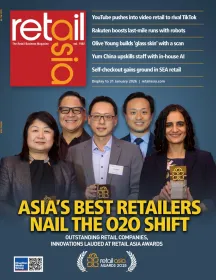
Put humans at the centre of transformation to remain competitive – EY’s Olivier Gergele
He highlighted six interdependent disruptive forces in consumer products and retail sectors, and how to leverage technology and human-centred strategies to remain at the forefront of the industry.
As consumer behaviour becomes increasingly data-driven and sustainability-focussed, companies face both opportunities and challenges in adapting to these rapid changes whilst striving to meet the demands of a globalised and diverse marketplace.
Offering valuable insights is Olivier Gergele, Asia-Pacific EY-Parthenon Consumer Leader and the EY ASEAN Consumer Products & Retail Leader, based in Singapore. He brings extensive operational and consulting expertise in the consumer products and retail sectors and assists clients in engagements such as strategy development, operating model and organisation review, go-to-market definition, value creation, and large-scale commercial and cost transformation programmes.
His focus is on growth strategies, innovation, value creation, go-to-market, sales and marketing effectiveness, profitability improvement, cost and complexity reduction, change management, and large-scale transformation. He also dedicated over a decade to a leading multinational consumer goods corporation, driving innovation across geographies and brands.
As a judge at the FMCG Asia Awards 2024, Gergele discussed that companies must adapt to shifting consumer priorities towards affordability and sustainability, navigate disruptive forces, and leverage technology and human-centred strategies to remain competitive.
With over 20 years in the consulting and consumer sectors, how have you seen the role of consumer insights evolve in shaping business strategies?
Over the past two decades, the role of consumer insights in shaping business strategies has evolved significantly, driven by advancements in technology, data analytics, and a deeper understanding of consumer behaviour.
The proliferation of big data and advanced analytics has enabled companies to gather consumer insights in real-time, from consumer purchase patterns to information on how they interact with the brand. Companies are now able to make informed decisions and be more agile to respond to changes in consumer behaviour, adapt their business strategies to evolving market trends, and anticipate the future consumer.
These real-time consumer insights have also empowered companies to offer personalised and even hyper-personalised products and services. They can go a step further in consumer segmentation, beyond standard parameters like demographics and psychographics, and tailor experiences on a more granular level, for example, based on shopping history and preferences. The outcome: increased consumer satisfaction, engagement, and loyalty.
Lastly, companies can integrate data across multiple touchpoints. This is no longer limited to in-store and online purchase data. Data integration enables them to have a holistic view of their consumers and develop omnichannel strategies.
With the consumer landscape continuously evolving, what do you see as the most pressing trends or disruptions shaping the future of the consumer products and retail industries?
The consumer products and retail sector is being shaped by six interdependent disruptive forces:
Shifting of consumer priorities: Consumers are gravitating toward affordable, personalised, and sustainable products and services. There is greater focus on conscious consumerism, which is the practice of making purchase decisions that are informed by ethical, environmental, and social considerations.
Technology advancements: Retail is being revolutionised by artificial intelligence (AI), including generative AI, data analytics and predictive analytics, and immersive technologies like augmented reality and virtual reality. Technology advancements have also put cybersecurity at the forefront.
Industry convergence: Traditional boundaries between different industries are becoming less distinct as companies leverage innovation and ecosystem partnerships to venture beyond their core business and expand product and service offerings.
Economic and geopolitical dynamics: Inflation, energy costs, and geopolitical tensions are reshaping supply chains, prompting a strategic pivot from global to more localised networks to enhance resilience and adapt to trade shifts.
Regulatory landscape: The introduction of carbon border adjustments, plastic packaging taxes, and stringent ingredient regulations, for example, has led to a more complex regulatory environment and a greater requirement for supply chain transparency. Regulations also vary widely across different jurisdictions, requiring a robust approach to manage compliance.
Sustainability focus: The sector is actively pursuing sustainability through decarbonisation, circularity, and waste reduction within the value chain.
In the face of disruptive technologies and new business models, what strategies do you recommend for consumer product companies and retailers to remain competitive and adaptable?
To remain competitive and adaptable, consumer products and retail companies must put humans at the centre of transformation and not just focus on technology and process alone. In a study by EY and the University of Oxford, companies that put humans at the centre of transformation are 2.6 times more likely to succeed. By investing in upskilling and reskilling, employees can stay current with new technologies and business models, and continue to deliver quality consumer service.
At the same time, companies need to remain at the forefront of cutting-edge technologies, such as AI and data analytics. This will allow them to extract actionable consumer insights to personalise marketing, refine value propositions, gain competitive advantage, and make strategic business decisions quickly. These insights also enable companies to identify and reduce risks before they potentially escalate into larger issues.
Operationally, meaningful data allows for optimised inventory management and effective financial management. Companies can identify opportunities for cost savings, renegotiate supplier terms, and optimise cash flow.
To reduce risks associated with market volatility, companies can explore diversification to create additional revenue streams and decrease reliance on a single sector or market.
Looking at the global landscape, how do consumer preferences and buying behaviours vary between developed and developing markets? How do you foresee shifts in the global trade policies affecting the consumer products and retail sectors, and what should companies do to deal with them?
There is a marked difference in consumer preferences and buying behaviours between developed and developing markets, evident from the findings of the EY 2024 Future Consumer Index.
In developed markets, consumers often have higher disposable incomes and tend to prioritise convenience, quality and brand reputation. They are also more likely to engage with omnichannel retail, seek out sustainably and ethically produced goods, and show a preference for personalised products and services. Conversely, in developing markets, the focus may be more on accessibility and affordability. For companies, there is also a significant opportunity for market penetration and growth, as many consumers may be experiencing certain products and services for the first time. Geopolitical tensions, economic nationalism, and the pandemic have led to shifts in global trade policies that are significantly impacting the consumer products and retail sector. These shifts include increased trade barriers, a trend toward regionalisation and near-shoring of supply chains, and digitalisation of global value chains.
To navigate these changes, companies need to be agile and adaptable. It is critical for them to have a pulse on market trends and industry shifts, as well as any trade policies and regulatory changes across the different jurisdictions they operate. For instance, protectionist policies can lead to increased costs for imported goods, whilst trade agreements may open up or lower the barriers to enter new markets. Companies can diversify their supply chains or explore near-shoring options to reduce risks associated with global trade disruptions. They can also consider localising production to reduce import costs and adapt pricing strategies to maintain market competitiveness.
Companies should also invest in technologies like automation and AI to automate manual and repetitive operations and develop value-creation opportunities.
How do you assess and address the impact of global economic conditions such as inflation or currency fluctuations, on the consumer and retail industry?
Assessing and addressing the impact of global economic conditions on the consumer products and retail sector require a multifaceted approach.
According to the EY 2024 Future Consumer Index, as the cost of living and economic uncertainty rise, consumers tend to prioritise essential products, such as food and hygiene, and decrease their spending on non-essentials. This has led to consumers moving away from premium brands to more affordable ones with similar value propositions. Retailers can address this by expanding their range of value brands and offering promotions on essential items to attract cost-conscious consumers.
Having the technology and data on consumer behaviours and preferences can help companies make informed decisions about inventory management, pricing strategies, and marketing campaigns.
Persistent inflation and high input costs, compounded by geopolitical trade tensions, are contributing to supply chain disruptions and putting pressure on margins. Companies need to closely monitor these economic indicators and adjust their business strategies accordingly. For instance, they can diversify their supplier base to reduce risks and invest in technologies to improve supply chain visibility and agility.
Currency fluctuations can significantly impact the cost of imported goods, affecting both pricing strategies and profit margins. Retailers can hedge against currency risks through financial instruments and source products locally, where possible.
As a judge at the FMCG Asia Awards 2024, what are the primary qualities and contributions you are looking for when evaluating nominees?
I will be looking for qualities like:
Resilience and flexibility: Nominees should show they can swiftly adapt to market changes and disruptions, and display resilience and a proactive stance when it comes to seizing opportunities and mitigating risks.
Compelling value proposition: Nominees should provide outstanding value through superior product quality, exemplary consumer service, and an exceptional consumer experience.
Innovative applications of technologies: Nominees should demonstrate the use of inventive strategies, such as leveraging data analytics and AI, to streamline operations, elevate consumer experience, revolutionise their sales, and marketing approaches or develop value creation opportunities to drive growth.
Strategic ecosystem engagement: Nominees should illustrate how they have formed and nurtured strategic partnerships to venture beyond their core business and innovate new product and service offerings.
Commitment to sustainability: Nominees should exhibit their sustainability practices and efforts to create more sustainable products and services.
As nominees present their work and achievements, I extend my best wishes to all participants. May your innovative spirit and dedication to excellence shine brightly throughout the FMCG Asia Awards 2024.
Good luck to each of you as you continue to set new benchmarks for the consumer products and retail sector!










